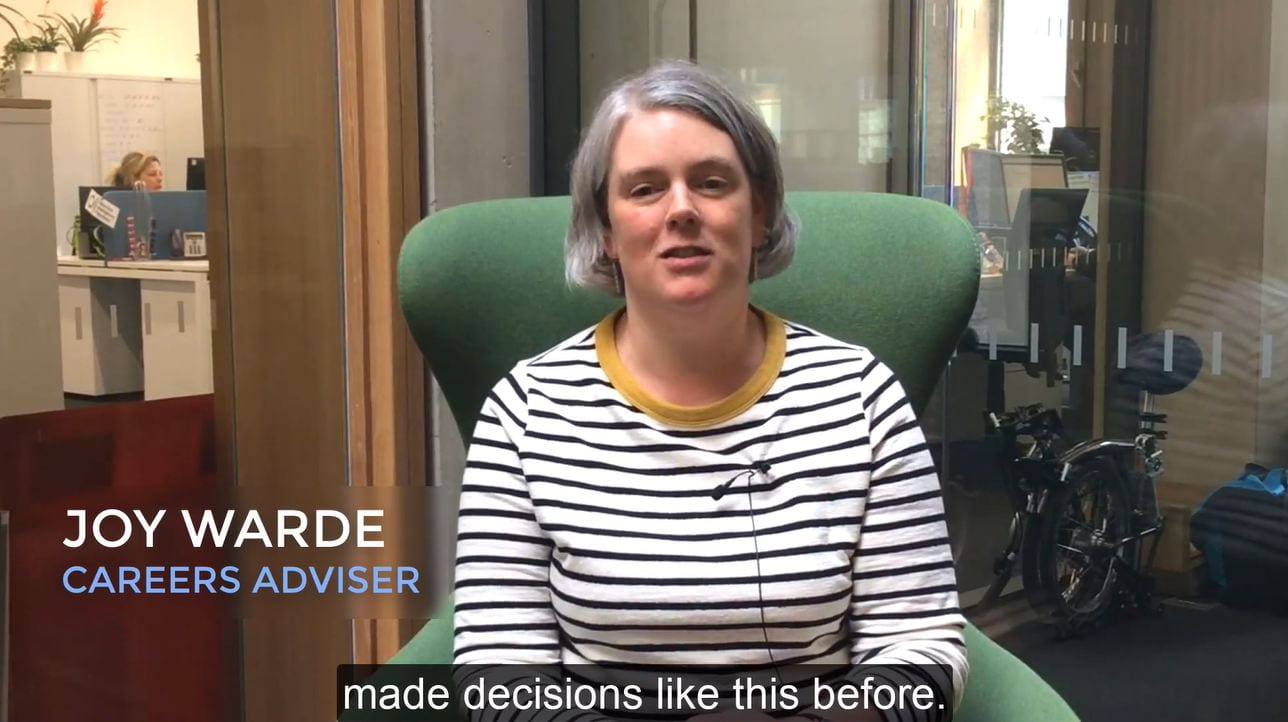Thinking about a career is daunting to many, especially if you’re not one of those few people who’ve known what they want to do since they were a child! But, never fear: the Careers Service is here to help guide you as you explore some options early on. Here are our top tips for getting started in picking a career
Make a bucket CV
If you do one thing at the beginning of your careers research, we recommend you create a ‘bucket CV’ – a document which includes absolutely everything you’ve done and achieved, highlighting your skills and characteristics. In the bucket CV you should list your school experiences and grades, any work experience, societies and sports clubs you’ve been invovled in, other extracurricular activities and projects, as well as your personal interests. Compose this document in a completely untargeted fashion and highlight the key skills you’ve developed across all the activities and experiences listed above. You may want to refer to our CVs & Applications Book for ideas on this. Essentially, this is a brain dump of everything you’ve ever done! You can edit this down later when you have something to apply for, but it’s invaluable having a brainstormed document to draw content from as you research what you may want to do.
Identify where you’ve been happiest
Obviously, you won’t be going through life grinning from ear to ear every minute of your career, but you’re probably going to be working for a minimum of 8 hours a day, 5 days a week, so it’s worth identifying what makes you happy and how this may feed into your career choice. So, we advise you to sit down and consider not just when you were happy but why – what gives you satisfaction? For example, are you a planning kind of person; a completer finisher (get satisfaction from the goal achieved); a people person; prefer working on your own, with other people; with numbers; fundraising; motivating others. Are you motivated by the actions of what you’re doing, or the content? If you enjoy writing essays, for example, is it the process of researching, learning new stuff and then writing about it, or the content of what you’re researching and writing about, that you relish? Equally, think about the skills you have that you never want to use again – for example, if you can’t stand editing written work, or conducting in-depth research.
Once you’ve begun mapping out what makes you tick and the skills you wish to bring to the fore, you can rule out certain careers based on your findings
Consider your personal values, personality and interests
Ensuring your job doesn’t conflict with your personal values is important, as is thinking about how your day-to-day role may make the best of your personality and wider interests. Testing out these facets of you as an individual can be achieved through psychometric tests as well as through trying out various extracurricular pursuits while you’re at Cambridge. Once you’ve begun mapping out what makes you tick and the skills you wish to bring to the fore, you can rule out certain careers based on your findings. For example, would you hate working outdoors, or working with children or around animals? Would you dislike needing to conduct research or dealing with complex data? Are you looking for something in tune with your faith or concern for environmental issues? Would you despise living in or commuting to a busy city, or the potential humdrum of a quiet town? Perhaps certain careers won’t be a good fit for you if you’re looking for a work-life balance; or to earn an exceptional amount of money? Writing down your core values and must haves/must not haves will make it easy to rule out certain opportunities once you come to the point of looking for jobs.
Think beyond your subject
While some students may use their degree as a starting point in their careers research, if you’re looking to enter into one of the major graduate career paths, many firms will recruit students from any discipline. In this case, it’s worth researching career options on a sector basis, instead of strictly in line with your area of study. Our Careers Sector A-Z pages are a useful place to start exploring your options, and learning about the more strict deadlines for graduate schemes and internships.

And, finally…
- Avoid comparing yourself to others, as everyone has a different journey and we are all individuals, so no two career research paths will be the same.
- Doing something, anything, is better than remaining in a frozen state and lacking in direction. Testing out your interests and passions can be achieved in a variety of ways, from vacation work, taking a gap year, extracurricular activities, writing your own blog or vlog series, or shadowing a friend or family member in a career which captures your imagination.
- Make the most of the Careers Service. We’re here to help advise you, save you time and maximise your chances of success once you begin applying for jobs in the future. You can tap into our services and resources anytime at www.careers.cam.ac.uk, and we’re open year-round! You may want to make a start by attending one of our Career Essentials sessions

